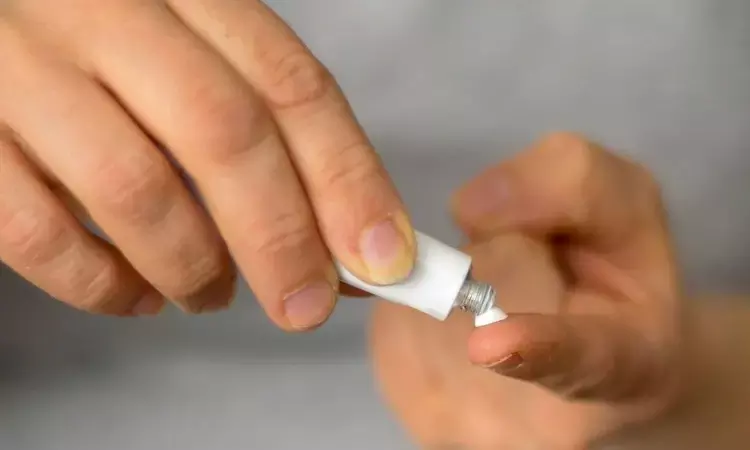- Home
- Medical news & Guidelines
- Anesthesiology
- Cardiology and CTVS
- Critical Care
- Dentistry
- Dermatology
- Diabetes and Endocrinology
- ENT
- Gastroenterology
- Medicine
- Nephrology
- Neurology
- Obstretics-Gynaecology
- Oncology
- Ophthalmology
- Orthopaedics
- Pediatrics-Neonatology
- Psychiatry
- Pulmonology
- Radiology
- Surgery
- Urology
- Laboratory Medicine
- Diet
- Nursing
- Paramedical
- Physiotherapy
- Health news
- Fact Check
- Bone Health Fact Check
- Brain Health Fact Check
- Cancer Related Fact Check
- Child Care Fact Check
- Dental and oral health fact check
- Diabetes and metabolic health fact check
- Diet and Nutrition Fact Check
- Eye and ENT Care Fact Check
- Fitness fact check
- Gut health fact check
- Heart health fact check
- Kidney health fact check
- Medical education fact check
- Men's health fact check
- Respiratory fact check
- Skin and hair care fact check
- Vaccine and Immunization fact check
- Women's health fact check
- AYUSH
- State News
- Andaman and Nicobar Islands
- Andhra Pradesh
- Arunachal Pradesh
- Assam
- Bihar
- Chandigarh
- Chattisgarh
- Dadra and Nagar Haveli
- Daman and Diu
- Delhi
- Goa
- Gujarat
- Haryana
- Himachal Pradesh
- Jammu & Kashmir
- Jharkhand
- Karnataka
- Kerala
- Ladakh
- Lakshadweep
- Madhya Pradesh
- Maharashtra
- Manipur
- Meghalaya
- Mizoram
- Nagaland
- Odisha
- Puducherry
- Punjab
- Rajasthan
- Sikkim
- Tamil Nadu
- Telangana
- Tripura
- Uttar Pradesh
- Uttrakhand
- West Bengal
- Medical Education
- Industry
Topical sucralfate promotes wound healing after hemorrhoidectomy: Study

Topical sucralfate reduced the need for pethidine and diclofenac while also reducing pain and promoting wound healing, says an article published in International Wound Journal.
The anal cushions' symptomatic expansion and distal displacement are known as hemorrhoids, a frequent benign anorectal disease. Depending on the degree and severity of symptoms, treatment options for hemorrhoids can range from dietary and lifestyle changes to open surgery. After a hemorrhoidectomy, pain is still one of the most common complaints from patients. Pethidine is a synthetic opioid analgesic that is frequently used for moderate to severe acute pain, including that experienced during labor, by patients recovering from surgery, and after open hemorrhoidectomy. Diclofenac is a non-steroidal anti-inflammatory medicine (NSAID) that is frequently used to treat mild to moderate pain. When taken frequently, it can cause nausea, vomiting, and renal impairment.
It is frequently administered following an open hemorrhoidectomy and has been administered intravenously, orally, or rectal. Topical sucralfate is frequently used to treat burns and excoriations. It is believed to improve tissue granulation and epidermal development, hence resolving patients' issues. Reno Rudiman and colleagues undertook this trial to assess the feasibility, safety, and superiority of topical sucralfate following hemorrhoidectomy.
In comparison to a placebo, researchers looked at how topical sucralfate affected wound healing rate, pethidine use, and postoperative pain scores (at 24 hours, 7 days, and 14 days). The PRISMA guidelines were followed during the conduct of this investigation.
The key findings of this study were as follow:
1. The remaining six trials involving 439 individuals who had hemorrhoidectomy were sorted in this study.
2. Topical sucralfate showed substantial improvements in VAS at 24 hours, 7 days, and 14 days after surgery, as well as in pethidine use within 24 hours, diclofenac use at 7 days, wound healing rate at 14 days, and VAS at 24 hours, 7 days, and 14 days after surgery.
In conclusion, topical sucralfate decreased analgesic use, increased wound healing speed, and improved pain ratings. Therefore, topical sucralfate is a beneficial, safe, and practicable therapy following hemorrhoidectomy.
Reference:
Rudiman, R., Hanafi, R. V., Evan, C., & Halim, F. (2022). The efficacy of topical sucralfate in improving pain and wound healing after haemorrhoidectomy procedure: A systematic review, meta‐analysis , and meta‐regression of randomised clinical trials. In International Wound Journal. Wiley. https://doi.org/10.1111/iwj.13901
Neuroscience Masters graduate
Jacinthlyn Sylvia, a Neuroscience Master's graduate from Chennai has worked extensively in deciphering the neurobiology of cognition and motor control in aging. She also has spread-out exposure to Neurosurgery from her Bachelor’s. She is currently involved in active Neuro-Oncology research. She is an upcoming neuroscientist with a fiery passion for writing. Her news cover at Medical Dialogues feature recent discoveries and updates from the healthcare and biomedical research fields. She can be reached at editorial@medicaldialogues.in
Dr Kamal Kant Kohli-MBBS, DTCD- a chest specialist with more than 30 years of practice and a flair for writing clinical articles, Dr Kamal Kant Kohli joined Medical Dialogues as a Chief Editor of Medical News. Besides writing articles, as an editor, he proofreads and verifies all the medical content published on Medical Dialogues including those coming from journals, studies,medical conferences,guidelines etc. Email: drkohli@medicaldialogues.in. Contact no. 011-43720751


